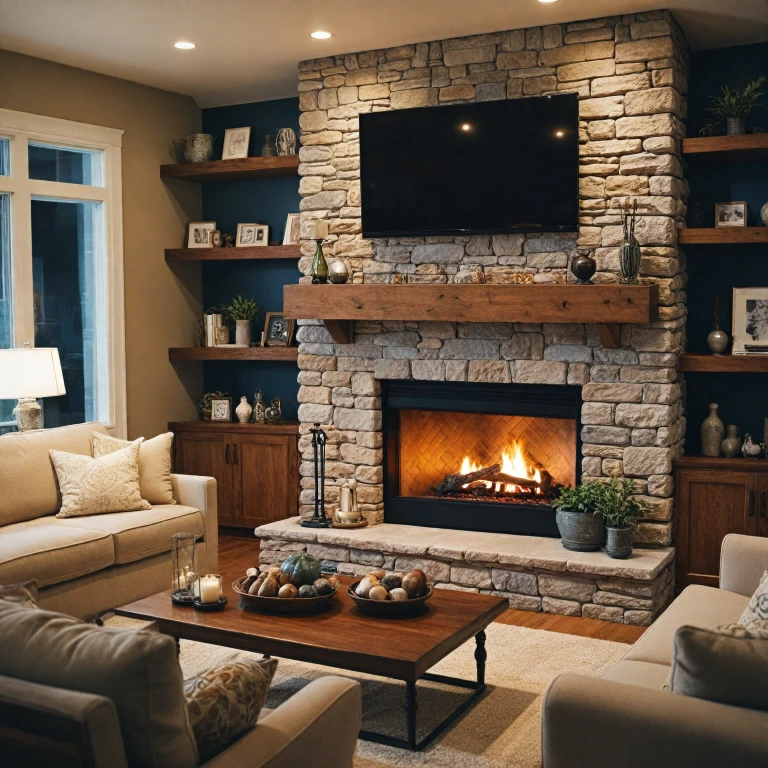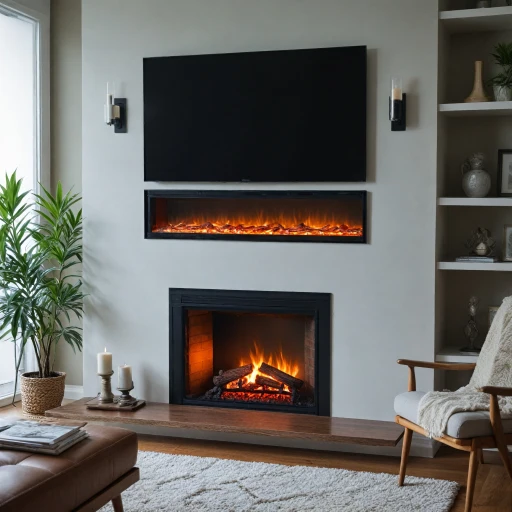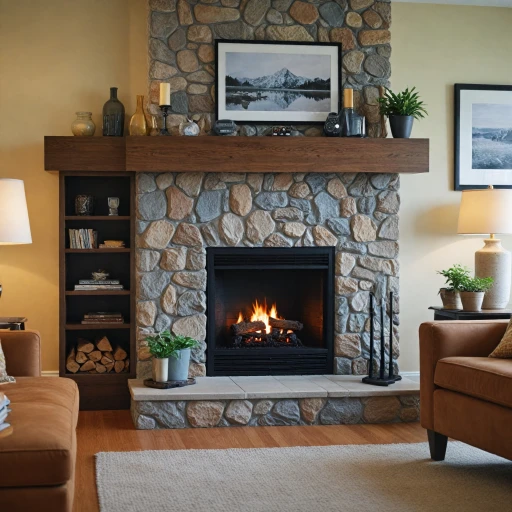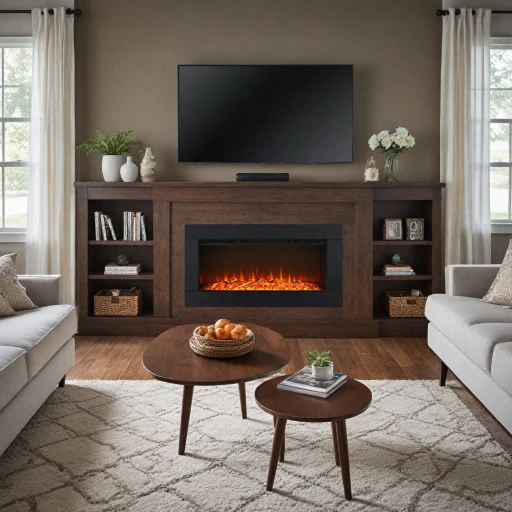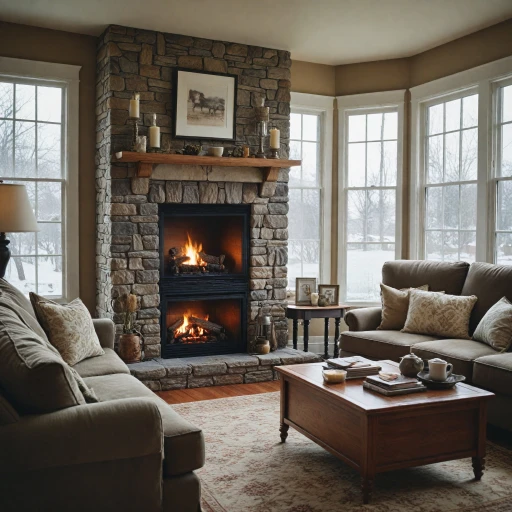
Comparing Gas and Electric Fireplaces
Weighing the Differences Between Gas and Electric Fireplaces
When envisioning that warm spot in your home, the choice between a gas and an electric fireplace can be a bit puzzling. Let's break it down to help make an informed choice for your cozy corner. Gas fireplaces have been the classic choice for many homeowners, providing the look and feel of real flames using gas logs or a gas insert. They can be vented gas models that use a chimney or venting system to direct fumes outside, mimicking the experience of a wood burning fireplace without the need for hauling logs. However, this traditional charm often involves a more significant initial investment, with installation costs being higher due to the labor of running gas lines and adapting a direct vent system. On the contrary, electric fireplaces offer a more convenient solution. These fireplaces don't require a chimney or vent system, making installation simpler and often more affordable. Plus, they offer flexibility with fireplace inserts that can fit into your existing structure without much fuss. Many appreciate the freedom to relocate the unit if desired — a distinct advantage over the fixed nature of a gas fireplace. What's more, the average cost to maintain an electric fireplace is often lower than its gas counterpart. Electric units allow for precise control over the heat and flame settings, presenting an efficient way to warm your space without consuming natural gas. Plus, the absence of a burning fireplace significantly reduces the risks associated with traditional fire hazards. Intrigued by what an electric fireplace can offer? Delve deeper into their numerous benefits to see if it fits your home's needs and your budget.Initial Installation Costs for Gas Fireplaces
Upfront Expenses When Choosing a Gas Fireplace
When thinking about a cozy night by a gas fireplace, it's crucial to look at the initial price tag of getting it set up. Many folks are drawn to the traditional charm of a wood burning or gas insert, but there are specific upfront costs you should keep in mind.- Unit Pricing: The price of gas fireplaces varies significantly, depending on the model, features, and manufacturer. A basic gas insert might be more budget-friendly, whereas more sophisticated units, like a direct vent system, demand a higher financial commitment.
- Professional Installation: While some might consider going the DIY route, installing a gas fireplace often requires the expertise of a professional due to various complexities involved. You have to account for labor costs, which typically depend on your location and the complexity of the installation process.
- Gas Line Installation: One significant expense for gas fireplaces is installing or upgrading a gas line. If you're working with natural gas, a qualified technician will need to run new gas lines to the unit, which adds to the overall cost.
- Ventilation Needs: Vented gas models often require chimney work or the installation of additional venting structures to safely expel fumes, adding an extra layer of expense. Understanding whether your space can accommodate vented gas is vital to avoid surprise costs.
- Fireplace Inserts: If you’re upgrading from a traditional wood burning fireplace, converting it with inserts can add another cost. While fireplace inserts breathe new life into an older fireplace, they come with their own price points that you’ll need to budget for.
Operating Costs of Gas vs. Electric Fireplaces
Crunching the Numbers: Keeping the Flame Alive
When considering gas and electric fireplaces, a key factor often leading the decision is the operating costs associated with each. While the allure of a traditional wooden-burning fireplace is undeniable, let's weigh the practicalities of keeping the home toasty warm. Electric fireplaces bring a contemporary touch with their streamlined designs and the ability to provide heat without the fuss of firewood or gas lines. Despite an electric unit's reputation for consuming less overall, it's important to account for your area's electricity rates. Typically, the cost to operate an electric fireplace depends on its wattage and your local electricity rate. Generally, running an electric fireplace insert can be more affordable compared to the ongoing costs of vented gas units, especially if you're burning fireplace a few hours a day. Despite that, gas fireplaces, whether they're vented gas or direct vent, often offer greater heat output for larger spaces. They provide a realistic flame effect, often winning over those longing for that authentic roaring fire. However, the cost associated with continuously operating a gas fireplace isn't minor; it includes natural gas consumption, potential maintenance of gas lines, and the insertion of gas logs. Making a clear comparison is tricky, as your specific needs and local rates will influence the ultimate choice. Remember, during installation, labor costs for electric insert setups are usually slimmer than those required for a vented gas option, which often demands a chimney or existing structure modification. The average cost savings might direct homeowners to electric choices, especially for those prioritizing energy efficiency and straightforward installation. Interestingly, linking a wood stove blower fan with your electric unit can optimize heat distribution and save on electricity, further enhancing your heating experience—see more on that here. Understanding these differences can guide homeowners to select the fireplace option that effectively balances their need for ambiance, budget, and energy efficiency.Benefits of Choosing an Electric Fireplace
Why An Electric Fireplace Might Just Be Your Best Bet
Electric fireplaces have been gaining traction lately, and for good reason. They're more than just a pretty face in your living room—they come with a suite of advantages that might make them the right option for your home.Easy Installation and Lower Costs
Unlike traditional gas or wood-burning fireplaces, electric fireplaces don't require a chimney or venting, significantly cutting down on installation time and costs. You don't have to worry about complex setups or expensive labor fees. Often, all these electric units need is a nearby electrical outlet.Energy Efficiency and Cost Effectiveness
Electric fireplaces are champions of convenience. They are generally more energy-efficient than their gas counterparts. Why? Because they convert nearly all their energy into heat without wastage from venting. If you're mindful of budget, you'll appreciate that these units can be cheaper to operate, as they allow users to heat specific areas without the need for full-home heating.Safety First
Safety is another key benefit. Without actual flames, electric fireplaces eliminate the risks associated with burning wood or gas. No risk of toxic fumes, gas leaks, or improper burning. Parents and pet owners can breathe a little easier knowing the unit won't have hot surfaces that may hurt curious little ones or furry friends.Endless Styles and Placement Flexibility
Aesthetically, electric options cater to practically every taste. Whether you fancy modern, sleek designs or more traditional styles, there's likely a fireplace insert to match your decor. Plus, you get the freedom to install them wherever you please, thanks to designs that allow for wall mounts, inserts, or standalone units. Each type of fireplace has its unique strengths and potential constraints. As you weigh your options, contemplate what aligns best with your lifestyle, budget, and home setup. While gas fireplaces deliver a classic ambiance and substantial heat, electric fireplaces greet users with ease, cost savings, and a diverse style range that fits any room.Potential Challenges with Electric Fireplaces
Considerations When Opting for Electric Fireplaces
Electric fireplaces have become a popular choice for many homeowners due to their ease of installation and lower average cost compared to traditional gas fireplaces. However, there are a few challenges to keep in mind when considering this option.
- Heat Output: While electric fireplaces are efficient, they may not provide the same level of heat as a wood burning or gas fireplace. This can be a concern in larger spaces or particularly cold climates where more substantial heating is required.
- Realism: Despite advancements in technology, some users feel that electric fireplaces lack the authentic look and feel of a burning fireplace. The flames are simulated, which might not satisfy those looking for the traditional ambiance of a wood burning fireplace.
- Electricity Dependency: Unlike gas inserts or wood burning fireplaces, electric units rely on electricity. This means they won't function during a power outage unless you have a backup power source.
- Installation Limitations: While the installation costs are generally lower, electric fireplaces still require a nearby power outlet. This can limit placement options within your home unless additional electrical work is done.
Despite these challenges, electric fireplaces offer a convenient and cost-effective solution for those looking to add warmth and style to their home without the hassle of a chimney or vented gas system. Weighing these factors alongside the benefits discussed earlier will help you make a well-informed decision.
Making an Informed Decision
Considerations for Choosing the Right Fireplace
Deciding on the perfect fireplace involves several thoughtful considerations. Both gas and electric fireplaces come with their unique sets of benefits and challenges, and understanding these aspects is essential in making an informed decision.
First, evaluate the initial installation costs. Gas fireplaces, especially those needing a direct vent setup, often involve more complex installation costs due to venting and gas line requirements. This can spike the budget due to labor and materials. In contrast, electric fireplaces generally have simpler installation needs, lacking the need for a chimney or extended venting, making them more wallet-friendly upfront.
Next, think about operational expenses. Electric fireplaces typically have a more consistent and sometimes lower average cost of operation. They don't involve gas logs or natural gas costs, which can fluctuate. Gas fireplaces, on the other hand, provide a more authentic flame and better heat output that can be a significant driver for some homeowners, especially in colder climates.
Weighing the benefits and potential challenges is paramount. Electric fireplaces often provide safer options for families with young children or pets, avoiding the risks associated with open flames or hot glass. However, for those who cherish the traditional crackling wood ambiance, a wood-burning option or certain gas inserts might be more appealing.
Last but not least, envision your ideal lifestyle fit. If you're looking for simplicity and modern convenience, electric fireplaces might become your favorite home feature. If traditional charm and higher, natural warmth are your priorities, investing in a gas or wood fireplace could be well worth the extra attention during installation and operation.

